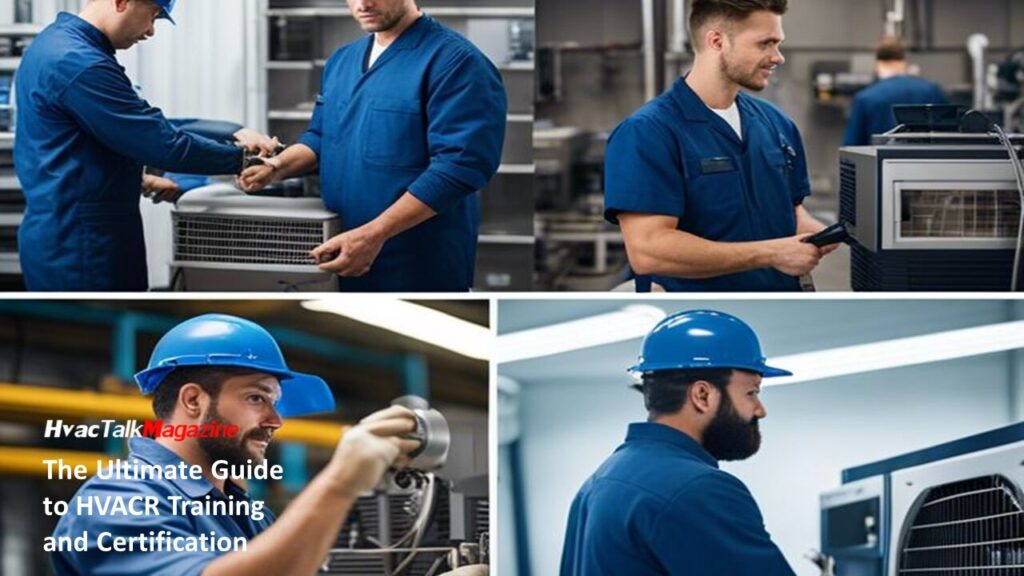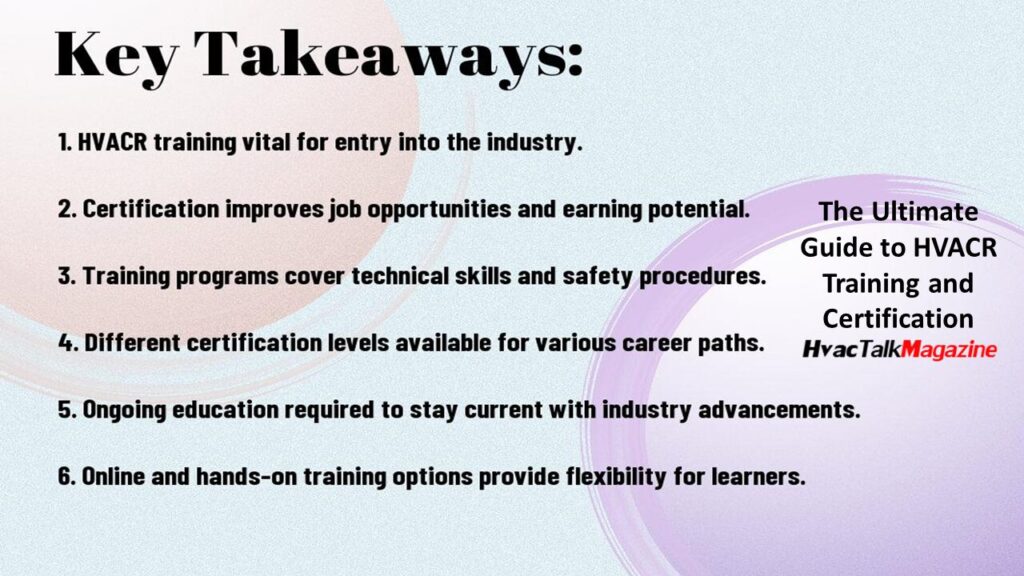The Ultimate Guide to HVACR Training and Certification
HVACR Training (Heating, Ventilation, Air Conditioning, and Refrigeration) is crucial for a successful career in the field. Becoming certified not only validates your knowledge and skills but also opens up opportunities for higher-paying jobs. In this comprehensive guide, we will walk you through the importance of HVACR training and certification, the different types of certifications available, and how to choose the right training program for your career goals.

Key Takeaways:
- HVACR Training is Essential: Proper training is crucial to understanding the complexities of HVACR systems and being able to troubleshoot and repair them effectively.
- Choose Accredited Programs: Look for training programs that are accredited by industry organizations like ACCA or NATE to ensure high-quality education and certification.
- Hands-On Experience Matters: Practical experience is key in the HVACR field, so seek out programs that offer hands-on training opportunities.
- Consider Specialized Certifications: Beyond the basic certification, consider pursuing specialized certifications in areas like refrigeration or air balancing to advance your career.
- Stay Updated with Technology: The HVACR industry is constantly evolving, so ongoing training and certification are necessary to keep up with new technologies and best practices.
- Networking is Important: Building connections with industry professionals can open up job opportunities and help you stay current with industry trends.
- Continuing Education is Key: Continuous learning through workshops, seminars, and online courses is necessary to stay competitive in the HVACR field.
The Ultimate Guide to HVACR Training and Certification
Definition and Overview
For those unfamiliar with the term, HVACR stands for Heating, Ventilation, Air Conditioning, and Refrigeration. This term encompasses a wide range of systems that are crucial for maintaining comfortable indoor environments.
Importance in Modern Life
Modern society relies heavily on HVACR systems to regulate temperature and air quality in homes, offices, hospitals, and other buildings. Properly functioning HVACR systems are crucial for ensuring comfort, health, and safety.
Another critical aspect of HVACR is its impact on energy efficiency. Well-maintained HVACR systems can significantly reduce energy consumption and lower utility bills, contributing to a more sustainable future.

Types of HVACR Certifications
Any individual looking to pursue a career in HVACR must obtain the necessary certifications to demonstrate their knowledge and expertise in the field. There are various types of certifications available, each focusing on different aspects of heating, ventilation, air conditioning, and refrigeration systems. The most common certifications include NATE Certification, R-410A Certification, EPA 608 Certification, and other specialized certifications.
| NATE Certification | R-410A Certification |
| EPA 608 Certification | Other Specialized Certifications |
NATE Certification
HVACR professionals often pursue NATE Certification to validate their skills in servicing and installing HVACR systems. This certification signifies a technician’s competency and knowledge in the field, providing assurance to employers and customers.
R-410A Certification
Certifications in R-410A refrigerant handling are crucial for HVACR technicians due to the harmful environmental effects of mishandling this refrigerant. Technicians with this certification are trained to safely handle and work with R-410A, ensuring both environmental safety and system efficiency.
EPA 608 Certification
For HVACR professionals working with refrigerants, EPA 608 Certification is a legal requirement set by the Environmental Protection Agency. This certification demonstrates the technician’s understanding of safe refrigerant handling practices and environmental regulations, important for protecting both the environment and public health.
Other Specialized Certifications
To further specialize in specific areas of HVACR, technicians can pursue Other Specialized Certifications such as energy efficiency certifications, ductwork design certifications, or solar heating certifications. These specialized certifications can enhance a technician’s skill set and open up new opportunities in the industry.
This guide provides an overview of the various types of certifications available in the HVACR industry, highlighting the importance of obtaining the necessary credentials to excel in the field.
Benefits of HVACR Certification
Increased Job Opportunities
Despite the competitive job market, HVACR certification can open doors to a variety of career opportunities. Employers often prefer candidates with formal training and certification, giving certified professionals an edge in the job application process.
Find and Post Jobs on the HvacJobsCenter here
Higher Salaries and Benefits
Benefits of obtaining HVACR certification include the potential for higher salaries and better benefits. Certified professionals typically command higher pay rates than their non-certified counterparts, along with access to additional perks such as health insurance and retirement plans.
Higher salaries and better benefits are attractive incentives for HVACR professionals to pursue certification. Employers value the expertise and credibility that comes with certification, leading to increased earning potential and improved job satisfaction for certified individuals.
TradesmanCE Overall (Electrical, Contractor, Plumbing & HVAC Courses: 10% off TradesmanCE continuing education using the “Deal22” code. Click to see electrical, contractor, plumbing, & HVAC courses.
Improved Job Security
Higher job security is another advantage of earning HVACR certification. Certified professionals are in high demand, with the HVACR industry experiencing steady growth. Having the necessary credentials can help secure long-term employment and provide stability in an unpredictable job market.
Plus, certified HVACR professionals are more likely to be retained during economic downturns or company restructuring due to their specialized skills and industry-recognized qualifications.
Enhanced Professional Reputation
A higher professional reputation is a key benefit of obtaining HVACR certification. Certified professionals are viewed as experts in their field, earning the trust and respect of clients and colleagues alike. This enhanced reputation can lead to more job opportunities and referrals, further advancing the career of certified professionals.
Increased professional reputation can also result in higher demand for services, allowing certified HVACR professionals to expand their client base and grow their business successfully.
HVACR Training Programs
Vocational Schools and Colleges
Now, HVACR training programs at vocational schools and colleges offer hands-on experience and comprehensive coursework in heating, ventilation, air conditioning, and refrigeration systems. These programs provide a solid foundation for a career in the HVACR industry.
Online Training Platforms
The convenience and flexibility of online training platforms make it easier for individuals to pursue HVACR certification from anywhere. The interactive modules, virtual simulations, and online resources help students master the necessary skills for a successful career in HVACR.
TradesmanCE – New Mexico HVAC: 10% off TradesmanCE.com New Mexico HVAC continuing education using promo code “deal22”. Click to see online courses!
Schools also offer apprenticeships and on-the-job training opportunities for aspiring HVACR technicians. These programs combine classroom instruction with real-world experience, allowing students to learn from seasoned professionals and gain practical skills in the field.
Apprenticeships and On-the-Job Training
Apprenticeships and on-the-job training programs provide aspiring HVACR technicians with the opportunity to learn from experienced professionals while earning a salary. These programs typically last 3-5 years and offer a structured curriculum that covers all aspects of HVACR systems.
TradesmanCE – Oklahoma HVAC: 10% off TradesmanCE.com Oklahoma HVAC continuing education using promo code “deal22”. Click to see online courses!
Manufacturer-Sponsored Training
Apprenticeships sponsored by manufacturers provide students with in-depth knowledge of specific HVACR brands and products. These programs often include training on installation, maintenance, and repairs for a particular manufacturer’s equipment, giving students a competitive edge in the industry.
This comprehensive guide explores various HVACR training programs to help individuals kickstart their careers in the heating, ventilation, air conditioning, and refrigeration industry. Whether you choose vocational schools, online platforms, apprenticeships, or manufacturer-sponsored training, each option offers unique benefits and opportunities for growth in the HVACR field.
Preparing for HVACR Certification Exams
Study Materials and Resources
Materials: To excel in your HVACR certification exam, it is crucial to have the right study materials and resources. Utilize textbooks, online courses, and reference guides to fully grasp the concepts and theories.
Practice Exams and Quizzes
Practice exams and quizzes are imperative tools for assessing your knowledge and identifying areas that require more focus. They help simulate exam conditions and improve your speed and accuracy in answering questions.
For instance, consider setting a timer when taking practice exams to mimic the actual test environment and work on developing your time management skills for the exam day.
Time Management and Test-Taking Strategies
Time: Efficient time management is key to acing your HVACR certification exam. Allocate specific time slots for each section and question, allowing yourself enough time to review and revise your answers.
This will help you stay organized during the exam and prevent you from spending too much time on challenging questions.
Tips for Success
TestTaking: Follow these tips to maximize your success on the HVACR certification exam:
- Start Early: Begin studying well in advance to cover all material thoroughly.
- Practice Regularly: Engage in consistent practice exams to assess your progress.
- Stay Calm: Maintain a calm demeanor during the exam to think clearly and answer accurately.
Perceiving the exam as an opportunity to showcase your knowledge and skills can boost your confidence and performance.
Resources: Utilize online forums, study groups, and practice exams to enhance your preparation. These resources can provide additional insights and support for a well-rounded study approach.
Maintaining and Renewing Certification
Continuing Education Requirements
Continuing education requirements are important for HVACR professionals to stay current with industry advancements. By participating in ongoing training and education, technicians can enhance their skills and knowledge, ensuring they provide the best service to their customers.
Recertification Process
On top of continuing education, HVACR professionals must undergo a recertification process to renew their credentials. This process typically involves completing a certain number of training hours and passing an exam to demonstrate proficiency in the field.
To maintain certification, technicians must stay informed about industry trends, regulations, and technologies. By regularly updating their knowledge, HVACR professionals can deliver top-notch service and remain competitive in the market.
Staying Current with Industry Developments
Current HVACR professionals should actively seek out industry publications, attend conferences, and participate in online forums to stay abreast of the latest developments. Keeping up-to-date with industry trends and best practices is crucial for maintaining certification and delivering high-quality service.
TradesmanCE – Texas HVAC: 10% off TradesmanCE.com Texas HVAC continuing education using promo code “deal22”. Click to see online courses!
Understanding the importance of professional development opportunities is key for HVACR technicians looking to advance their careers. By pursuing additional certifications, attending workshops, and seeking mentorship, professionals can improve their skills and open up new career opportunities.
To wrap up
Ultimately, the guide to HVACR training and certification serves as a valuable resource for those looking to enter the HVACR industry or advance their careers within it. By providing clear and concise explanations, this guide equips readers with the knowledge and guidance needed to navigate the world of HVACR training and certification successfully. Whether you are just starting or looking to take your career to the next level, this comprehensive resource is sure to help you on your journey toward success in the HVACR field.
Tip of the Day
Boost your career with comprehensive HVACR training books! Gain expert knowledge, and practical skills, and stay updated with industry standards.
👉 Shop now and invest in your future with top-rated HVACR training books. Enhance your expertise and advance your career today!
FAQ
Q: What is HVACR training and certification?
A: HVACR training and certification programs prepare individuals for careers in heating, ventilation, air conditioning, and refrigeration. These programs provide the necessary knowledge and skills to work in the HVACR industry.
Q: Why is HVACR training and certification important?
A: HVACR training and certification are important because they demonstrate that an individual has the knowledge and skills required to work safely and effectively in the HVACR field. Certification can also lead to better job opportunities and higher earning potential.
Q: How long does it take to complete HVACR training and certification?
A: The length of HVACR training programs can vary depending on the type of program and the institution offering it. Some programs can be completed in as little as six months, while others may take two years or more to finish.
Q: What are the requirements for enrolling in HVACR training programs?
A: Requirements for enrolling in HVACR training programs can vary, but generally, individuals need a high school diploma or equivalent. Some programs may also require certain math or science courses as prerequisites.
Q: How much does HVACR training and certification cost?
A: The cost of HVACR training and certification programs can vary widely depending on the program, institution, and location. Tuition for these programs can range from a few thousand dollars to tens of thousands of dollars.
Q: What can I expect to learn in an HVACR training program?
A: In an HVACR training program, students can expect to learn about heating systems, air conditioning systems, refrigeration systems, electrical systems, and more. They will also learn about HVACR principles, codes, and regulations.
TradesmanCE – Virginia HVAC: 10% off TradesmanCE.com Virginia HVAC continuing education using promo code “deal22”. Click to see online courses!
Q: How can HVACR certification benefit my career?
A: HVACR certification can benefit your career by validating your skills and knowledge to potential employers. Certified professionals may have better job prospects, higher salaries, and increased opportunities for advancement in the HVACR industry.
Follow Us on Google Chrome
- To get started, switch to Google Chrome Browser
- Already on our site
- Top right, tap the 3 dots
- Bottom right, tap follow
- You are done.
Learn more and join our mailing list for updates.
This post has been written by Team HVAC Talk Magazine. Stay informed and connected with the latest in HVAC—join us for expert advice, troubleshooting tips, and news updates. Don’t miss out, follow us now! #HVACExperts #HVACTips #StayInformed #HVACProTalk





